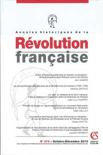
ANNALES HISTORIQUES DE LA REVOLUTION FRANCAISE
Scope & Guideline
Connecting Past and Present Through Revolutionary Insights
Introduction
Aims and Scopes
- Historical Analysis of Revolutionary Events:
The journal publishes in-depth analyses of key events during the French Revolution, such as the execution of Louis XVI, significant battles, and the rise and fall of political figures, aiming to provide a nuanced understanding of these moments. - Social and Cultural Dimensions:
It emphasizes the social and cultural impacts of the Revolution, exploring themes like gender roles, emotional responses, and public sentiment, thereby contributing to a broader understanding of how the Revolution influenced everyday life. - Interdisciplinary Approaches:
The journal encourages interdisciplinary studies, incorporating perspectives from sociology, political science, and cultural studies to enrich the historical discourse surrounding the Revolution. - Global Context and Comparisons:
There is a consistent focus on comparing the French Revolution with other revolutionary movements worldwide, examining its influence on global political thought and movements. - Critical Re-evaluations of Historical Figures:
The journal frequently revisits the roles of prominent figures in the Revolution, such as Robespierre and Danton, analyzing their contributions and the myths surrounding them to offer fresh insights.
Trending and Emerging
- Emotional and Psychological Perspectives:
There is a growing trend towards exploring the emotional and psychological dimensions of the Revolution, examining how feelings such as fear, hope, and anger shaped revolutionary actions and ideologies. - Gender Studies and Feminist Perspectives:
The journal has increasingly included works that analyze the role of women during the Revolution, addressing gender dynamics and the contributions of female revolutionaries, reflecting a wider scholarly interest in feminist historiography. - Public Opinion and Media Influence:
Recent publications focus on the role of public opinion and media during the Revolution, highlighting how newspapers, pamphlets, and public discourse influenced revolutionary events and ideologies. - Transnational and Comparative Studies:
Emerging themes include transnational studies that compare the French Revolution with other revolutionary movements globally, demonstrating the interconnectedness of revolutionary ideas across borders. - Cultural Representations and Memory:
There is an increasing interest in how the Revolution is represented in culture, including literature, art, and cinema, as well as how collective memory of the Revolution continues to shape modern identities.
Declining or Waning
- Traditional Military History:
There has been a noticeable decline in publications focusing solely on military strategies and battles of the Revolution, as the journal increasingly prioritizes social and cultural analyses over conventional military narratives. - Biographical Studies of Lesser-Known Figures:
While the journal has historically included biographical studies of various revolutionary figures, there seems to be a waning interest in exploring lesser-known individuals, with more emphasis placed on major historical personalities. - Economic Analysis of the Revolution:
The economic aspects of the French Revolution, such as trade and financial policies, appear to be receiving less attention compared to the emotional and social dimensions, indicating a shift in research focus. - Static Interpretations of Revolutionary Ideals:
There is a decline in papers that present static interpretations of revolutionary ideals like liberty, equality, and fraternity, with a move towards more dynamic and contextual analyses.
Similar Journals
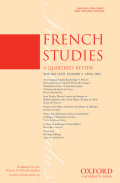
FRENCH STUDIES
Exploring the Depths of French HeritageFRENCH STUDIES is a premier academic journal published by Oxford University Press, dedicated to advancing the fields of Cultural Studies, History, Linguistics, and Literature. Established in 1947, the journal has become a significant platform for interdisciplinary research, reflecting on the complexity and richness of French cultural and literary heritage. With an impact factor that positions it in Quartiles Q2 and Q3 across various categories, including Literature and Literary Theory, FRENCH STUDIES is recognized for its scholarly contributions and insights into historical narratives, linguistic developments, and cultural analyses. The journal does not currently offer open access options, yet it remains an essential resource for researchers, professionals, and students seeking to deepen their understanding of French studies and its global implications. The journal's commitment to quality and intellectual rigor is evidenced through its Scopus rankings, making it a valuable asset for the academic community in the United Kingdom and beyond.
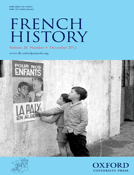
French History
Charting the Course of France's Historical JourneyFrench History, published by Oxford University Press, is a prestigious academic journal dedicated to the exploration and analysis of France's rich historical narrative from its ancient origins to contemporary developments. With an ISSN of 0269-1191 and an E-ISSN of 1477-4542, this journal has been a vital resource for scholars and researchers since its inception in 1987. Covering a wide range of topics within the field of history, it ranks in the Q2 category in the 2023 evaluation, reflecting its robust scholarship and relevance. French History provides an indispensable platform for innovative research, facilitating a deeper understanding of the cultural, social, and political dynamics that have shaped France. Although it does not offer open access, its articles are meticulously curated to engage academics and practitioners interested in the multifaceted exploration of French history. With a Scopus ranking placing it at #1016 in the Arts and Humanities History category, this journal remains a cornerstone for those committed to the study of French historical scholarship.
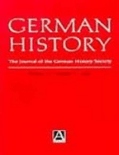
German History
Fostering Dialogue on Germany's Dynamic LegacyGerman History is a leading academic journal published by Oxford University Press, focusing on the rich and multifaceted history of Germany from the medieval period to contemporary times. With a strong emphasis on interdisciplinary approaches, this journal invites contributions that explore social, cultural, political, and economic aspects of German history. Established in 1984, and with comprehensive publication coverage from 1984 to 1994 and from 1996 to 2024, German History occupies a significant place in the historical field, currently ranked in the Q2 category as per the 2023 Scopus rankings. Although it does not offer open access options, the journal continues to uphold academic rigor and scholarly excellence, making it a crucial resource for researchers, professionals, and students engaged in the study of German history. With a commitment to fostering high-quality research and dialogue, German History remains an essential platform for critical discourse and groundbreaking scholarship in the field.

Materiales para la Historia del Deporte
Preserving Narratives: Documenting the Evolution of Sports HistoryMateriales para la Historia del Deporte, published by UNIV POLITECN MADRID, GRP INVEST ESTUDIOS SOCIALES & HUMAN ACT FIS & DEPORTE, is a premier open-access journal dedicated to the interdisciplinary study of sports history, promoting scholarly research and discourse in this vital field since 2007. With an E-ISSN of 2340-7166, the journal welcomes contributions that not only examine historical dimensions but also explore the sociocultural impacts of sport on society. Positioned in Madrid, Spain, the journal serves as an essential platform for researchers, professionals, and students seeking to engage with rich narratives and critical analyses associated with the history of sport. Through its commitment to open access, Materiales para la Historia del Deporte ensures that knowledge is freely available, fostering collaboration and innovation among scholars across the globe. As it continues to build a repository of valuable research, this journal stands out as a leading voice in documenting and understanding the evolving landscape of sports history.
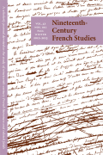
NINETEENTH-CENTURY FRENCH STUDIES
Unraveling the Rich Tapestry of French CultureNINETEENTH-CENTURY FRENCH STUDIES, published by University of Nebraska Press, is a premier academic journal dedicated to the exploration and analysis of French literature and culture from the 19th century. Established as a vital resource for scholars in the field, this journal is recognized for its contribution to literary studies, holding a commendable Q2 rating in the 2023 category of Literature and Literary Theory, reflecting its academic rigor and relevance. With an ISSN of 0146-7891, it offers a platform for innovative research and scholarly discourse, delving into critical topics that shape our understanding of the era. Although it does not currently operate as an open-access journal, its impactful research is instrumental in guiding literary analysis within the arts and humanities. As it continues its publication journey, converging from 2001 to 2024, NINETEENTH-CENTURY FRENCH STUDIES remains essential for researchers, professionals, and students aiming to gain deeper insights into the complexities of 19th-century French literature.

Review of Middle East Studies
Catalyzing Academic Dialogue on Middle Eastern ThemesReview of Middle East Studies, published by Cambridge University Press, is an essential academic journal that serves as a platform for interdisciplinary research focused on the Middle East. With an ISSN of 2151-3481 and an E-ISSN of 2329-3225, this journal has been disseminating impactful scholarship since its inception in 2007. Despite its placement in Q4 for Cultural Studies and Sociology and Political Science, and Q3 for History in the 2023 journal rankings, it continues to attract diverse contributions and discussions that enrich our understanding of the region. The journal's scope encompasses a broad spectrum of themes, enabling researchers and educators alike to engage with contemporary issues facing the Middle East. Although it operates under a traditional access model, its significance and contribution to academic discourse in the humanities and social sciences cannot be understated. With its headquarters in the United States, this journal fosters global connections and paves the way for future research endeavors in related fields.
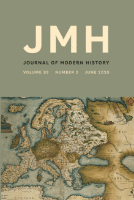
JOURNAL OF MODERN HISTORY
Illuminating the Impact of History on Today’s SocietyJOURNAL OF MODERN HISTORY is a premier academic publication specializing in the field of History, published by the University of Chicago Press. With an esteemed Q2 category ranking in the 2023 history quartiles, this journal serves as a pivotal platform for scholarly discourse that examines modern historical events and their impact on contemporary society. The journal has established a solid reputation, evidenced by its Scopus rank of #272 out of 1760 in Arts and Humanities, placing it in the 84th percentile. With a rich history dating back to its inception in 1975, it continues to provide researchers, professionals, and students with access to rigorous peer-reviewed articles that push the boundaries of historical understanding. While it does not offer open access, the journal treasures the depth of scholarship offered through its meticulously curated content, making it an essential resource for anyone seeking to navigate the complexities of modern history.
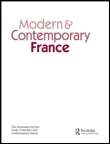
Modern & Contemporary France
Advancing Scholarship on Contemporary French IssuesModern & Contemporary France is a prestigious journal published by Routledge Journals, Taylor & Francis Ltd, focusing on the rich tapestry of French culture, history, and politics from the 20th century to the present day. With an ISSN of 0963-9489 and an E-ISSN of 1469-9869, this influential periodical has established itself as a leading voice in the field, holding a Q2 ranking in both Cultural Studies and History as of 2023. This journal is an invaluable resource for researchers, professionals, and students, providing critical insights and fostering scholarly discussions around contemporary and modern issues concerning France. Its commitment to excellence is further underscored by its notable Scopus rankings, highlighting its significance in the realms of Arts, Humanities, and Social Sciences. Though it operates under a subscription model, the depth and breadth of articles published between 1993 and 2024 make it an essential tool for anyone seeking to understand the complexities of current French society and its historical underpinnings.

Kwartalnik Historii Zydow-Jewish History Quarterly
Connecting Cultures Through Jewish Historical InsightsKwartalnik Historii Żydów - Jewish History Quarterly is a dedicated academic journal published by the esteemed Jewish Historical Institute in Warsaw, Poland. With an ISSN of 1899-3044, this quarterly publication serves as a vital platform for scholarly discourse on Jewish history, culture, and heritage. The journal aims to reflect the diversity and complexity of Jewish experiences across historical contexts, making it an essential resource for researchers, professionals, and students in the fields of History, Religious Studies, and Cultural Studies. Despite its recent coverage discontinuation in Scopus from 2012 to 2015, the journal's rankings within its respective categories indicate a modestly engaged readership and potential for contribution, particularly seen in its ranks of 339/388 in Religious Studies and 859/975 in History. Although the journal operates on a non-open access basis, its curated articles enrich the understanding of Jewish narratives and interactions within broader socio-cultural frameworks, underlining its importance in promoting historical knowledge and cultural appreciation.
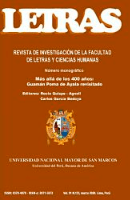
Letras-Lima
Connecting scholars through cultural exchange.Letras-Lima is a prestigious open-access journal published by the Universidad Nacional Mayor de San Marcos in Peru, dedicated to advancing the fields of Arts and Humanities, Cultural Studies, Linguistics, and Literature. Since its transition to open access in 2003, it has established itself as a vital resource for scholars and practitioners alike, aiming to foster intellectual discourse and cultural exchange across disciplines. The journal boasts a commendable impact factor, with a range of Q2 to Q4 quartiles within its respective categories for 2023, reflecting its commitment to quality and relevance. Notably, it holds a significant role in promoting literature and literary theory, currently ranking 240 out of 1,106 in the category, indicating it occupies the 78th percentile of publications in its field. Addressing the complexities and nuances of language and culture, Letras-Lima serves as an essential platform for researchers, professionals, and students seeking to disseminate and engage with transformative ideas that shape our understanding of society and identity.